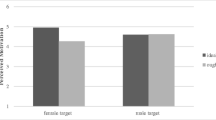Abstract
The purpose of this paper is to explore the relative empirical support for two alternative ways of interpreting the relationship between masculinity and irrationality. The common denominator in this particular relationship was theoretically assumed to either reflect a person's ‘locus of control’ expectations or his/her level of self-esteem.
Two separate empirical studies were performed with groups of undergraduate university students. Both studies replicated earlier results, thus supporting the masculinity hypothesis as the one accounting for the relationship between sex-role orientation and irrationality.
Of the two possible common denominators explaining this relationship, level of self-esteem was the one receiving the strongest empirical support. Some interesting gender differences concerning these two possible common denominators were also found.
Similar content being viewed by others
References
Alsaker, F.D. & Hovland, O.J. (in press). Irrationality as a self-defeating value-orientation: A further study of the SVO-12.Journal of Rational Emotive Therapy.
Alsaker, F.D., Hovland, O.J. & Vollmer, F. (1985). Sex-role related personality traits and irrationality.Scandinavian Journal of Psychology, 26, 187–189.
Bern, S.L. (1974). The measurement of psychological adrogyny.Journal of Consulting and Clinical Psychology, 42, 155–162.
Ellis, A. (1959). Rationalism and its therapeutic applications. In A. Ellis (Ed.),The place of value in the practice of psychotherapy. New York: American Academy of Psychotherapists.
Ellis, A. (1962).Reason and emotion in psychotherapy. Secaucus, New Jersey: Lyle Stuart.
Ellis, A. (1973).Humanistic psychotherapy. The Rational-Emotive Approach. McGraw-Hill, New York.
Ellis, A. (1977a). The basic clinical theory of Rational-Emotive Therapy. In A. Ellis, & R. Grieger, (Eds.),Handbook of RET. New York: Springer Publishing Co.
Ellis, A. (1977b). Research data and personality hypotheses of RET and other cognitive behavior therapies. In A. Ellis & R. Grieger (Eds.),Handbook of RET. New York: Springer Publishing Co.
Ellis, A. (1979a). Rational-Emotive Therapy. In A. Ellis, & J.M. Whiteley (Eds.),Theoretical and empirical foundations of Rational-Emotive Therapy. Monterey, California, Brook/Cole Publishing Company.
Ellis, A. (1979b). Toward a new theory of personality. In A. Ellis & J.M. Whiteley (Eds.),Theoretical and empirical foundations of Rational-Emotive Therapy. Monterey, California. Brook/Cole Publishing Company.
Ellis, A. (1984). The essence of RET-1984.Journal of Rational-Emotive Therapy, 2, 19–25.
Hovland. O.J. (1983a).Selvsaboterende verdiorientering og psykopatologi (I). Teoretisk rasjonale for et alternativt selvbeskrivelsesskjema (SVO-13) basert på Albert Ellis antagelser om “irrasjonelle” overbevisninger. (Self-defeating Value-Orientation and psychopathology I: Theoretical back-ground for the SVO-Scale). (Psykologisk rapportserie. No.2). Bergen University: Faculty of Psychology.
Hovland, O.J. (1983b).Selvsaboterende verdiorientering og psykopatologi (II): Empirisk utprØving av et nytt selvbeskrivelsesskjema (SVO-13) basert pà Ellis antagelser om “irrasjonelle” overbevisninger. (Self-defeating Value-orientation and psychopathology II: A preliminary empirical inquiry of the SVO-Scale). (Psykologisk rapportserie, No.3). Bergen University: Faculty of Psychology.
Hovland, O.J. & Alsaker, F.D. (in press). Disruptive emotions and the measurement of irrationality: A preliminary evaluation of an emotive paradigm for measuring peoples' self-created absolute demands on reality.Journal of Rational-Emotive Therapy.
Rosenberg, N. (1965).Society and the adolescent self-image. Princeton: Princeton Univ. Press, 1965.
Rosenberg, M. (1979).Conceiving the self. New York: Basic Books.
Rotter, J.B. (1966). Generalized expectancies for internal vs. external control of Reinforcement.Psychological Monographs, 80:1, 1–28.
Spence, J.T., Helmreich, R. & Stapp, J. (1974). The Personal Attributes Questionnaire: A measure of sex-role stereotypes and masculinity—femininity.JSAS Catalog of Selected Documents in Psychology, 4, 127.
Spence, J.T. & Helmreich, R.L. (1978).Masculinity and femininity. Their psychological dimensions, correlates and antecedents. Austin: University of Texas Press.
Sutton-Simon, K. (1981). Assessing belief systems: Concepts and strategies for cognitive-behavioral interventions. In P.C. Kendall & S.D. Hollon (Eds.),Assessment strategies for cognitive-behavioral interventions. New York: Academic Press.
Taylor, M.C. & Hall, A.H. (1982). Psychological androgyny: Theories, methods, and conclusions.Psychological Bulletin, 92, 347–366.
Vollmer, F. (1984). Sex Differences in Personality and Expectancy.Sex Roles, 11, 1121–1139.
Vollmer, F. (in press). Why do men have higher expectancy than women?Sex Roles.
Whitley, B.E. (1983). Sex-role orientation and self-esteem: A critical metaanalytic review.Journal of Personality and Social Psychology, 44, 769–778.
Author information
Authors and Affiliations
Additional information
Ole Johan Hovland, Cand.paed., is Assistant professor of Personality Assessment at the Department of Personality Psychology, University of Bergen, Bergen, Norway, and maintains a small private practice in Laksevåg, Bergen, Norway. FranÇoise De Lange Alsaker, Cand.psychol., is a Research fellow in the field of personality development at the Department of Personality Psychology, University of Bergen, Bergen, Norway. Fred Vollmer, Mag.art., is Senior Lecturer in personality psychology at the University of Bergen, Bergen, Norway.
Rights and permissions
About this article
Cite this article
Hovland, O.J., Alsaker, F.D. & Vollmer, F. The masculinity—Irrationality relationship explored: Searching for a common denominator. J Rational-Emot Cognitive-Behav Ther 6, 172–182 (1988). https://doi.org/10.1007/BF01064078
Issue Date:
DOI: https://doi.org/10.1007/BF01064078




